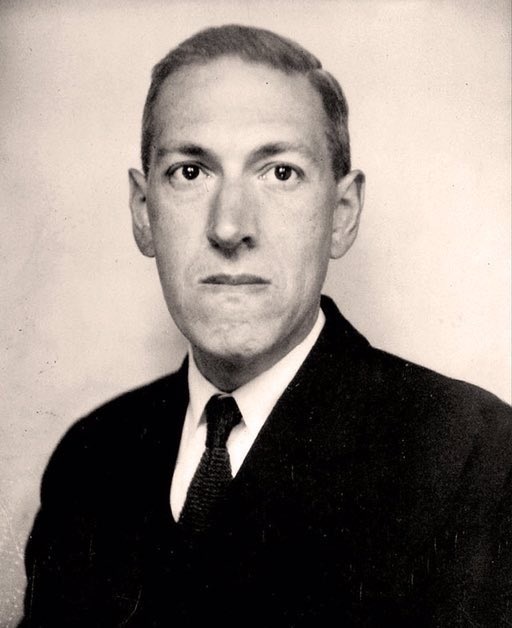da Supernatural Horror in Literature, 1927
Howard Phillips Lovecraft frasi celebri
Frasi sulla vita di Howard Phillips Lovecraft
da Ex Oblivion, 1921
Tutti i racconti 1897-1922
Frasi sul mondo di Howard Phillips Lovecraft
The Call of Cthulhu
da Qualcosa dall'alto, 1929
da L'oceano della notte, 1936
da La tomba, 1917
Howard Phillips Lovecraft Frasi e Citazioni
“Non è morto ciò che può vivere in eterno, | E in strani eoni anche la morte può morire.”
da La Città senza Nome, 1921
Variante: Non è morto ciò che può vivere in eterno,
E in strani eoni anche la morte può morire.
Le storie del ciclo di Cthulhu: Il mito. Tomo 1
citato in Montague Rhodes James, Fantasmi e altri orrori a cura di Gianni Pilo e Sebastiano Fusco, TEN, 1993
Tutte le storie dell'orrore puro. L'incubo. Tomo I
da Hypnos, 1922
da Lettere dall'altrove
da I gatti di Ulthar, 1920
explicit di Finché tutti i mari..., 1935
da Da altrove, 1920
Howard Phillips Lovecraft: Frasi in inglese
Letter to Robert E. Howard (7 November 1932), in Selected Letters 1932-1934 edited by August Derleth and Donald Wandrei, p. 102
Non-Fiction, Letters
Letter to Elizabeth Toldridge (9 October 1931), in Selected Letters III, 1929-1931 edited by August Derleth and Donald Wandrei, p. 423
Non-Fiction, Letters
Orignially written as part of an "Essay on Modern Poets" this was published as a "Fragment on Whitman” (c. 1912) in The Ancient Track (2001) edited by S. T. Joshi, p. 192
Non-Fiction
Letter to Reinhardt Kleiner (7 March 1920), in Selected Letters I, 1911-1924 edited by August Derleth and Donald Wandrei, p. 110
Non-Fiction, Letters
Letter to James F. Morton (10 February 1923), published in Selected Letters Vol. I (1965), p. 208
Non-Fiction, Letters, to James Ferdinand Morton, Jr.
the scattered plasticity of that nameless sky-spawn was nebulously recombining in its hateful original form...
Fiction, The Call of Cthulhu (1926)
The Allowable Rhyme (1915)
Non-Fiction
Letter to James F. Morton (6 November 1930), in Selected Letters III, 1929-1931 edited by August Derleth and Donald Wandrei, p. 207
Non-Fiction, Letters, to James Ferdinand Morton, Jr.
Fiction, The Crawling Chaos (1921)
"Pickman's Model " - written 1926; first published in Weird Tales, Vol. 10, No. 4 (October 1927)
Fiction
Response to observations made in In A Minor Key by Charles D. Isaacson, in The Conservative, Vol. I, No. 2, (1915), p. 4
Non-Fiction
"Facts Concerning the Late Arthur Jermyn and His Family" - written 1920; first published in The Wolverine, No. 9 (March 1921)
Fiction
Fiction, The Other Gods (1921)
At the Root (1918)
Non-Fiction
"Imprisoned with the Pharaohs" - Written February 1924, published May-June-July 1924 in Weird Tales
Fiction
Letter to Frank Belknap Long (27 February 1931), in Selected Letters III, 1929-1931 edited by August Derleth and Donald Wandrei, p. 293
Non-Fiction, Letters, to Frank Belknap Long
Attributed to Lovecraft by Harold Farnese, who corresponded with Lovecraft briefly, later presented by August Derleth as a direct quote; but as discussed on this page http://www.hplovecraft.com/life/myths.aspx#blackmagic, Farnese's letters to Derleth suggested he tended to paraphrase things Lovecraft had written to him, going by memory rather than referring to letters he had on hand. More details in "The Origin of Lovecraft’s 'Black Magic' Quote" by David E. Schultz, *Crypt of Cthulhu*, issue 48.
Disputed
Letter to Jennie K. Plaiser (8 July 1936), quoted in "H.P. Lovecraft, a Life" by S.T. Joshi, p. 564
Non-Fiction, Letters
“Disintegration is quite painless, I assure you.”
"From Beyond"
Fiction
“We must stop thinking primarily in terms of “money” and “business””
both artificial things—and begin to think increasingly in terms of the actual resources and products on which “money” and “business” are based. In terms of these, of the human beings to whom they are to be distributed, and of the cognate human values which make the accidents of life and consciousness worth enduring.
"Some Repetitions on the Times", (1933). Reprinted in Miscellaneous Writings, edited by S.T. Joshi. Arkham House, 1995.
Non-Fiction

